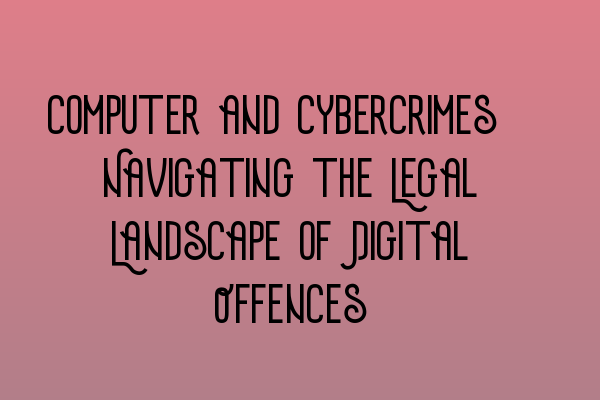Computer and Cybercrimes: Navigating the Legal Landscape of Digital Offences
In the digital age, computer and cybercrimes have become increasingly prevalent, posing new challenges for the legal profession. As technology advances, so do the methods used by criminals to exploit it. It is vital for legal practitioners to stay updated and informed about the ever-evolving legal landscape of digital offences.
The Scope of Computer and Cybercrimes
Computer and cybercrimes cover a wide range of activities, including hacking, identity theft, phishing, malware distribution, online fraud, and many others. These offences not only threaten the security and integrity of individuals and businesses but also have severe implications for national security and public safety.
To effectively combat computer and cybercrimes, it is crucial for legal professionals to have a comprehensive understanding of the relevant legislation, such as the Computer Misuse Act, Data Protection Act, and the Cybercrime Act. This knowledge ensures that practitioners can navigate the legal complexities associated with digital offences and appropriately represent their clients’ interests.
The Role of the Legal Profession
The legal profession plays a vital role in combating computer and cybercrimes. Solicitors specializing in criminal law and practice utilize their expertise to investigate, prosecute, and defend individuals accused of digital offences. Their knowledge and skills in handling digital evidence, understanding cybercriminal techniques, and navigating legal procedures are invaluable in ensuring a fair and just legal process.
As the legal landscape continuously evolves, it is imperative for legal practitioners to keep up with the latest developments in computer and cybercrimes. This can be achieved through professional development programs and courses focused on enhancing the understanding of digital offences and the associated legal frameworks.
Preparing for the Future
With the upcoming changes in legal education and training, such as the introduction of the Solicitors Qualification Examination (SQE), aspiring solicitors need to equip themselves with the necessary knowledge and skills to navigate the increasingly complex world of computer and cybercrimes.
SQE 1 and SQE 2 preparation courses provide aspiring solicitors with a solid foundation in criminal law and practice, including computer and cybercrimes. These courses encompass comprehensive training on legal principles, statutory frameworks, case analysis, and practical skills required in dealing with digital offences. Practice exams, such as the SQE 1 Practice Exam Questions and SQE 1 Practice Mocks FLK1 FLK2, are also available to assess and reinforce students’ understanding of digital offences.
By successfully completing the SQE examinations and obtaining the necessary qualifications, solicitors can confidently represent their clients in cases involving computer and cybercrimes. These qualifications demonstrate the solicitors’ competence in understanding and navigating the legal complexities associated with digital offences, ensuring the provision of high-quality legal services.
Conclusion
Computer and cybercrimes present unique challenges in today’s digital world. As legal professionals, it is essential to stay abreast of the evolving legal landscape and equip ourselves with the knowledge and skills necessary to navigate the complexities of digital offences. By investing in professional development and undertaking SQE 1 and SQE 2 preparation courses, we can confidently confront the challenges posed by computer and cybercrimes and provide effective legal representation to our clients.
To learn more about SQE examinations and preparation courses, visit SQE 2 Preparation Courses and SQE 1 Preparation Courses. Stay updated on the latest SRA SQE exam dates at SRA SQE Exam Dates.
